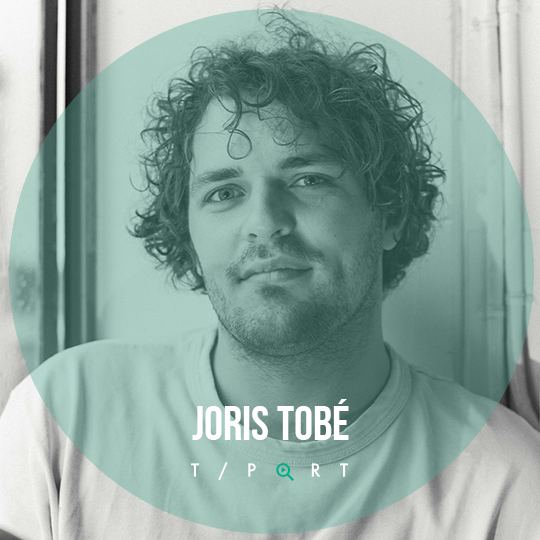
Joris Tobé’s graduation film FRANTIC ATTEMPTS appears at the Karlovy Vary Film Festival this week courtesy of our partners at EFP Future Frames, and it was awarded the Circle of Film Critics Award for best graduation film at the Dutch Film Festival.
In this heartwarming interview we take a deep dive with the director into philosophy, how to work with actors, and experiencing the pure joy of filmmaking. Read the full interview on our blog.
Hi Joris! Introduce yourself in a few lines
My name is Joris Tobé and I am based in Amsterdam, the Netherlands. I graduated from film school in July 2022 with my graduation film FRANTIC ATTEMPTS, that won the Circle of Film Critics Award at the Dutch film festival.
Since my graduation I have been mostly writing scripts and movie plans for different purposes. I also started writing for a possible new feature film that I intend to direct as well.
For me, film is a medium that enables me to live a thousand different lives at the same time. Film making began as a way of channelling my daydreams and was almost a way of escaping the simple and sometimes boring world as I knew it. As I explored the many sides and possibilities with the medium of film, I totally fell in love with it. Music, image, sound, storytelling, acting, writing…there is something so beautiful about the combination of all these art forms that I now could never imagine a life without film.
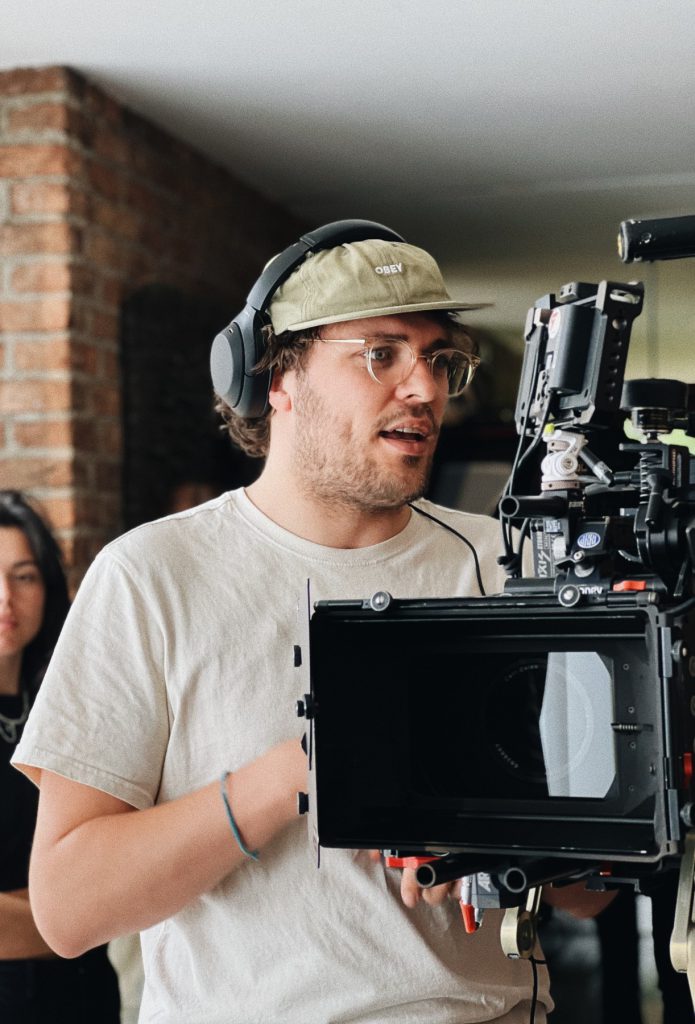
While working on the film, where did you draw your inspiration from?
I drew my inspiration from my own experiences on a ‘coaching trajectory’. More and more I started thinking about the reasons for other people and myself to come here. I realised the absurdity of the place I was in.
We, in the prosperous and capitalist West, are almost programmed to think that our happiness alway lies in the future. When I have this job, I will be happy. When I have this husband or wife, I will be happy. When I have this house, I will be finally happy. In my opinion this idea also penetrated deeper life matters than house, husband and job. When I have answers for my life questions, I will be happy. When I stop feeling sad sometimes, I will be finally happy.
What is the difference between that and thinking that a job or partner will get you happy? I think there is no difference. It is both in the future and something that is not there yet. And so we get tangled up in ourselves, feeling that we are never really whole.
I think this is the reason for the really high demand (and supply) for all sorts of coaches and gurus in the West.
But after a while I started thinking: isn’t buying off our suffering from a coach exactly the same dynamics as thinking that a car or a job will do this? The idea that if we just work hard enough and pay a lot of money, we can get rid of our suffering? The solution we seek for our problem (a coaching weekend) may well be the same dynamics as the problem itself.
I found that fascinating and started thinking: isn’t there a more healthy way to deal with our problems? I did really like the idea of this and decided that this is what my film should be about.
I did not want it to be a farce: there is a serious reason people go to such places, including myself. I was searching a lot and not finding any answers to my big life questions. I wanted to take all the characters seriously, but I also wanted to show the comedy of the place they ended up.
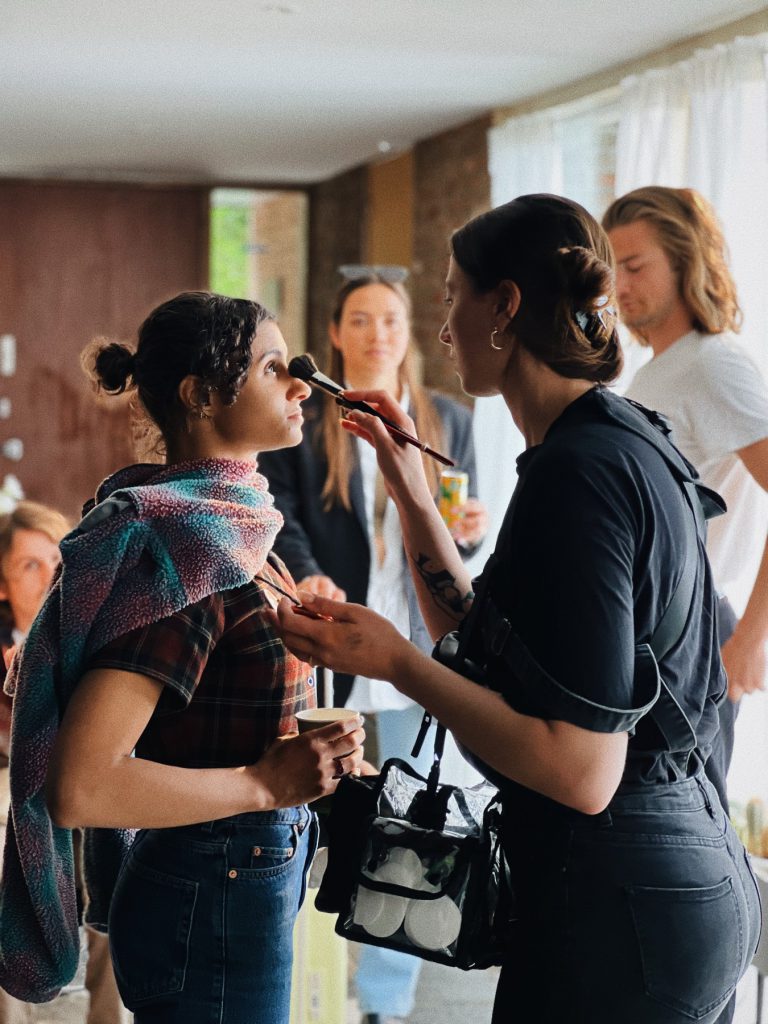
How did you first start working on this film? What was the process like?
I really liked the idea of an endearing/touching but hopeless chap that feels like life is growing over his head.
I kept going back to the content of the film and what it really had to be about before I really wanted to write the script. Because there was a lot of philosophy involved, I started reading a lot of books from different philosophers. I tried to make every character as whole as possible so I knew what they would do in certain situations and what they were really searching for, even the small characters.
I ended up writing the first version of the script on someone’s living boat in the cold winter in the Netherlands and took a dive in the ice cold water every morning. A whole routine grew with writing every morning and doing ‘director stuff’ in the afternoon. That routine has never left since.
Tell us a bit about your film and the filmmaking process – what did it take to make your film?
We actually had no budget to make the film in the beginning so we started a crowdfunding campaign. I also started to try and find a really motivated and talented crew that was enthusiastic about my idea while still writing the script. That was hard sometimes as I hadn’t anything to read for them and we had no budget for paying anyone. Because the film would be set in one location and almost became a character by itself, this was a really important matter for me.
Soon me, the DOP and the producers started a lot of location scouting to find the perfect place to set the film in.
After we found the perfect location and a really friendly couple that would rent their house out for a bargain, things really started to take off. We got a Dutch broadcaster involved in the film and even a production company that started to help us. Casting was a really enjoyable process where the film really started to come alive for me. I wrote a scene especially for the casting, in which all characters’ personalities came to life. This was the first moment that I realised we are really, really going to make a film.
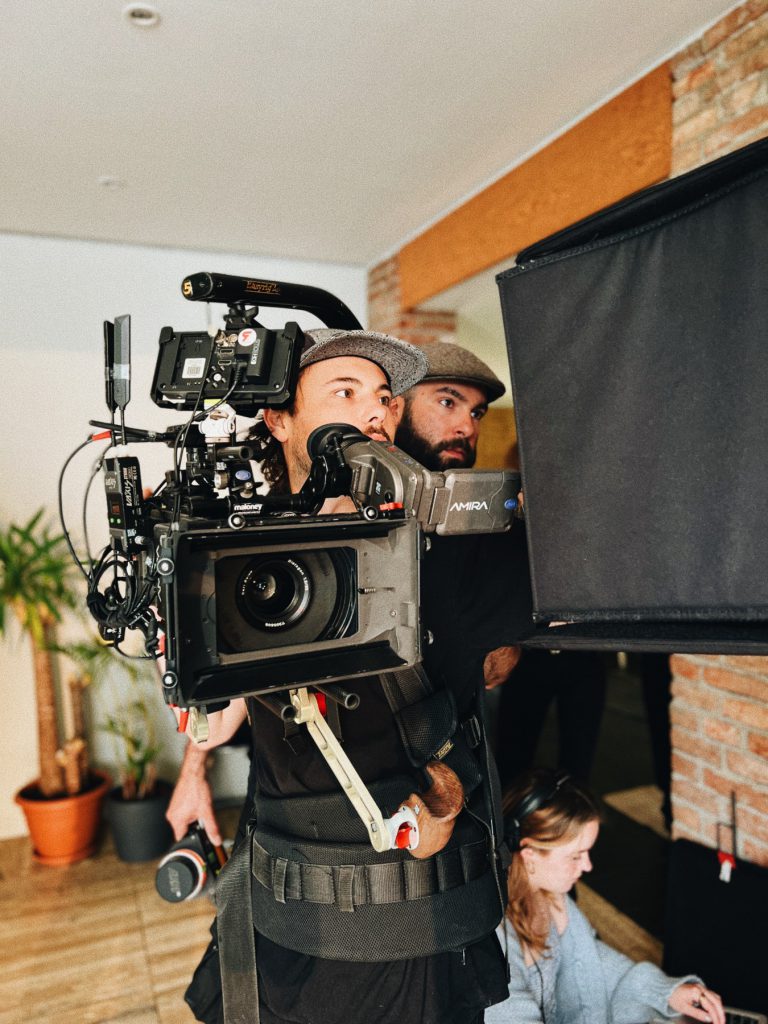
What were the biggest challenges you encountered during making your film?
Because it was a graduation movie I just had eight months from first idea to final product. This was one of the big challenges because I did not have much time to think about certain decisions. At the time this was really frustrating for me, but looking back I can see that it really helped me as a filmmaker. I became much better in making quick decisions and lingering less in doubt.
The other challenge was, as always, the challenge of having no money. In the beginning I felt guilty for not paying any hard working actor or crew member. This changed when I saw that everyone was working their hearts out and loved doing this for the sake of the project.
I still can’t believe so many talented and dedicated people were so motivated for the project.
How was it to collaborate with your cast and crew?
I never experienced a film set in my life where people would put everything aside for the sake of the project. Every department helped every department and I really got the feeling that something special was going on around me. I even spoke to crew members who were kind of emotional after the project finished because they missed the feeling of being on this particular set. Shooting in one location in the middle of nowhere and sleeping in a nearby hostel probably helped with this school camp-like feeling.
I speak to a lot of different people from the cast and crew still and would love to work with all of them on a next project as well. A special connection I could pick out is the friendship I built with the actor that plays the main character of the film, Robbert Bleij. We share a lot of the same sense of humour and have been working on a few projects since we met. We also do non-film stuff together now: he is a professional bushcrafter and recently took me to a weekend camping where he tried to teach me a lot of stuff I am really bad at.
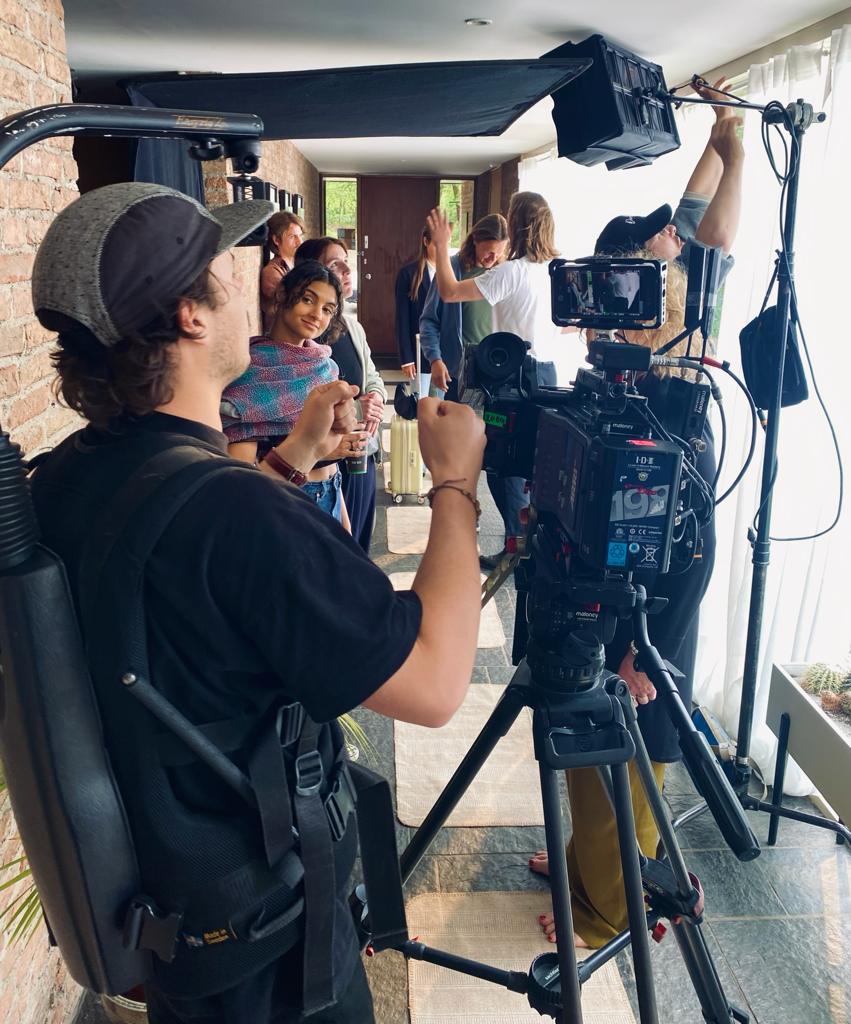
Tell us about the visual choices in your film. What were your main goals and techniques in creating the visual style of your film?
Regarding the visual style of the film, I really aimed for the viewer to feel present at the weekend. I didn’t want them to become just viewers that watched from a distance, but viewers that were really a part of the weekend.
I also liked the idea of a perfect, green and lush environment while the problems inside the house would pile up. This contrast makes the problems even harsher and more painful. If even an exceptionally beautiful place with green surroundings cannot fix your issues, the solution must be something other then just appearance.
Can you share the most important lessons you learned through the process of making the film?
I tried to look at situations and acting in a different way than before and this really worked well for me. During my first years in film school, I tried to picture the film in my mind and that is what it had to become. For this film I took the advice from many filmmakers that say: a film is made three times. Script, shooting, edit. A film set is not a place where you are going to make the picture in your head one and the same.
I tried to look at the actors and see if I believed what they did instead of directing them exactly how I wanted. If you believe a scene, you like it but it was not exactly what you had in mind. I asked myself: does this make the film better? If the answer was yes I went with it and so there was a lot more room for the actors to improvise and do things they felt the scene needed instead of only letting them do what I had in mind.
The same counts for editing. I didn’t try to edit the script, I edited a film I would like to see instead.
If you could go back in time to pre-production and give yourself one piece of advice, what would it be?
Try to enjoy the process, even the things that go wrong. In that sense I kind of learned the same lesson as the main character of the film. I was far too goal focussed without enjoying the process.
What was it like for you working with the actors you cast? Do you have a technique for directing actors you can tell us about?
I really love exploring and figuring a character out together with the actors. I think it is really important to do this before shooting because it gives you and the actor a common understanding of the character that will benefit your connection and workflow on set.
What I tried to communicate with the actors a lot is that the humour I look for in all situations I try to create, does not come from making jokes or playing a ‘funny’ character. Characters and moments only get funny, painful and tragic at the same time when the character and therefore the actor takes him/herself seriously. This is challenging at times because if the actor knows what is funny about a certain situation, the viewer can sense this and it becomes not really amusing to watch. I think the actors did really great with this but it was a point I had to come back to many times on set.
What would you like people to take away from your film?
That searching for answers is part of being a human being and is not something to be afraid of. There is a certain beauty in not knowing and when we embrace this instead of acting like we know it all, there will be far more peace in our lives and hearts.
How does it feel for you, as an artist, to see your work being accepted to festivals and more?
It means the world to me that something that started as some small ideas in my head, are now being watched by a lot of people from all over Europe (and even the world). This is a magic side of film making for me. To be able to think about some crazy ideas while laying in your bed and one year later you see your film being watched by a lot of different people is truly something magical and crazy at the same time.
How has the process of distributing the film been for you so far? What have you learned?
Because we did not really have a distributor I mostly did everything on my own. This was not easy, as this is totally not something I have any talent for. I tried to look for people that had already gone through this process with submitting your film to festivals etc. and gained a lot of knowledge in how the festival world worked. It’s still all really new for me though.
What I really did learn was that distributing your film is a speciality on its own and can be a real ‘maze’ if you don’t know anything about it. If you find someone to take care of this big part of filmmaking, don’t hesitate to collaborate! If this is impossible, I would say that it’s best to not be afraid of asking people how they did this. That can help a lot.
What do you wish you’d known before you began the distribution process?
We really did not get any great lessons in distribution at my film school, so I did almost nothing about it. I wish we gained some more knowledge on the importance of this part of filmmaking. I live in a country where almost all films are really heavily subsidised. I do have the feeling that because of this fact, producers are more focussed on making the actual movie than being focussed on marketing and distribution (this is just a feeling). I wish I had more understanding of the importance of this side of filmmaking before.
Has working with T-Port taught you anything about the industry?
I think it is wonderful that a platform like T-Port exists. So many aspiring film makers feel like drowning in the endless sea the industry can feel like. Producers, agents, money, new projects… it felt really overwhelming for me. Everything that can provide a somewhat softer landing for any aspiring film maker is therefore really helpful.
If you are a film industry professional and would like access to the catalogue and more, find out here how to sign up.
Filmmaker? Upload your short film to T-Port or sign up for our newsletter to get regular updates on the current trends and exciting innovations in the short film universe.
